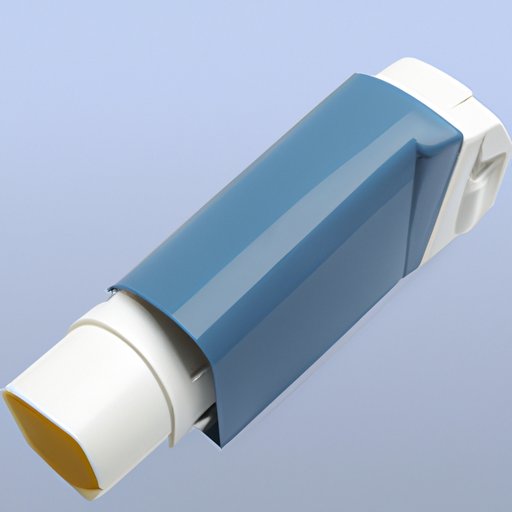
Introduction
If you or a loved one have asthma or chronic obstructive pulmonary disease (COPD), you may rely on an inhaler to manage symptoms and improve breathing. While inhalers can be life-saving tools, it’s important to use them properly to get the full benefits without experiencing potential risks.
In this article, we’ll explore the recommended guidelines for inhaler use, the potential risks of overusing an inhaler, tips on properly using an inhaler, and the importance of talking to your doctor. We’ll also provide personal anecdotes, case studies, and alternative treatment options to consider.
Recommended guidelines for inhaler use
When using an inhaler, it’s important to follow the maximum daily dose and frequency of use as recommended by healthcare professionals. The maximum daily dose varies depending on the type of inhaler and the individual’s needs and can range from two puffs every four to six hours to two puffs every 12 hours.
Overusing an inhaler can result in potential risks, such as side effects like tremors, increased heart rate, or decreased effectiveness. It’s essential to follow the recommended guidelines to ensure that you’re getting the full benefits of the medication without risking any negative consequences.
Potential risks of overusing an inhaler
While inhalers can be life-saving tools, overusing them can result in potential risks. In addition to side effects, overusing an inhaler can result in decreased effectiveness in managing symptoms, making it harder to breathe in the long run. Furthermore, relying solely on inhalers for asthma or COPD management can overlook alternative treatments that may be more effective for some individuals.
It’s crucial to talk to a healthcare provider about the potential risks of overusing an inhaler and develop an individualized treatment plan to better manage symptoms and avoid potential consequences.
Tips on properly using an inhaler
Proper inhaler use is essential to ensure that you’re getting the full benefits of the medication. Here are some helpful tips to keep in mind:
- Use a spacer if prescribed by your healthcare provider to improve medication delivery to the lungs.
- Rinse your mouth or brush your teeth after using an inhaler to avoid potential side effects like thrush from developing.
- Check your inhaler technique with your healthcare provider to make sure you’re using it properly.
The importance of talking to your doctor
It’s crucial to discuss inhaler use with your healthcare provider and develop an individualized treatment plan based on your needs. A healthcare provider can help determine the maximum daily dose and frequency of use that is appropriate for your condition. They can also monitor potential risks and help you decide when to switch to alternative treatments or adjust your medication.
If you have concerns about your inhaler use, don’t hesitate to schedule an appointment with your healthcare provider to discuss your options.
Personal anecdotes or case studies
For many people, inhaler use can be a confusing or overwhelming experience. Personal anecdotes or case studies can help provide some clarity and relatable examples of managing inhaler use. For example, some individuals may struggle with overusing inhalers due to anxiety around breathing difficulties. Others may have difficulty using a new type of inhaler correctly. By sharing these stories, readers can better understand the impact of inhaler misuse and feel less alone in their experiences.
Alternative treatments to consider
While inhalers can be effective in managing symptoms, it’s important to consider alternative treatments that may be more effective for some individuals. For example, lifestyle changes like exercise or weight loss can improve lung function. Complementary therapies like acupuncture or biofeedback can provide additional relief. And other medications like tablets or injections may be a better fit for some individuals.
It’s essential to research alternative treatment options with the help of a healthcare provider to ensure that you’re receiving safe and effective care.
Conclusion
In conclusion, proper inhaler use is essential to manage symptoms and avoid potential risks. By following the recommended guidelines, being mindful of potential risks, and talking to your healthcare provider, you can manage your respiratory condition with confidence. Additionally, considering alternative treatments that may be more effective for you can improve your overall respiratory health and quality of life.




